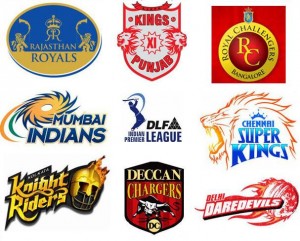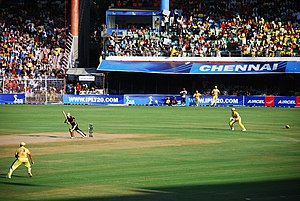In this post, I want to focus on how a completely new and highly strategic internet marketing revenue model has been created by the brains behind Indian Premier League (IPL).
- Image via Wikipedia
Most of the readers of this website I believe are aware what is cricket? It is a game of umpteen nuances and is being followed by more than 2 billion people around the world (I being one of them). In recent years, a new format was added named Twenty20 (T20) wherein only 20 overs are bowled. Presently, there is one regional contest going on called the ‘Indian Premier League’ (IPL). India is one of the major countries where cricket is taken quite seriously and is the most popular game. The model has similarity to the Football Leagues around the world wherein local clubs recruit local and international players and compete for winnings.
Let me first pose the problem. Most sporting tournaments require funding and a substantial chunk of this funding comes from Television rights and TV advertising followed by various other tactics such as merchandising and recently online rights. The advent of new technologies including peer-to-peer networks mixed with higher broadband coverage across many countries has created parallel channels for viewing the live event broadcasting without paying the required fees. It seems that such practice is quite popular among younger generation. This has a direct impact on the revenue an organizer of sporting event can generate.
Most event organizers dread these new media of live event broadcasting on internet by an individual sitting in his o
r her own house with a broadband connection which then is being watched by many others. These individuals using their own websites charge nominal fees for the broadcast and sometimes make these events available for free. Some of these websites use elaborate email marketing, web advertising, web marketing and mobile marketing to lure consumers. This in turn means that the original broadcaster loses revenue due to an illegitimate supplier. Most times corporate event organizers try to go behind these individuals following legal route which in itself is quite resource intensive.
IPL which is in its 3rd season is also one of the quite popular cricket events watched by more than 1 billion people across the world. Such event will surely face the problem of live event broadcasting by various individual cricketing websites.
However, the organizers have created a completely new streaming model which has put all these problems to end. They have partnered with one of the most trusted brands in online viewing of various media – YouTube. The event is being broadcasted live on YouTube for free. The model has some interesting strategic implications for all involved including consumers, IPL organizers, advertisers and YouTube (Google).
1. It stops those illegitimate suppliers of streams as the event is broadcasted for free.
2. Using YouTube’s technology the event is broadcasted with quality optimal for an individual’s connection speed. This in turn, created a better user-experience.
3. It increases the reach of the event to a much wider audience. Not all viewers on YouTube will be aware of cricket but some of them will be exposed to the sport.
4. Two new sources of revenues can be observed: (a) google’s online ad revenue network which is one of the most sophisticated and (b) advertisers who wish to advertise on the live event.
5. This also provides an opportunity for advertisers to geo-target the audience to utmost finesse. The reason for this being google’s advance geo-targeting mechanism. In turn, this can reduce the overall spend and bring much more focus in terms of overall revenues.
6. This event also provides YouTube (Google) with an added weapon in their armoury, which is to go to other event organizers and get the online rights to broadcast events on this massive scale.
I believe that this strategic masterstroke delivered by IPL organizers have created a completely new revenue model for event organizers which brings about a win-all situation. The only loser being the illegitimate online broadcaster. I believe other event broadcasters should seriously look into this new way of generating revenues and utilize the opportunity to the fullest extent.
[/fusion_builder_column][/fusion_builder_row][/fusion_builder_container]

![Reblog this post [with Zemanta]](http://img.zemanta.com/reblog_e.png?x-id=f04f26ee-a3be-4d14-a561-e9ba6f436b53)





